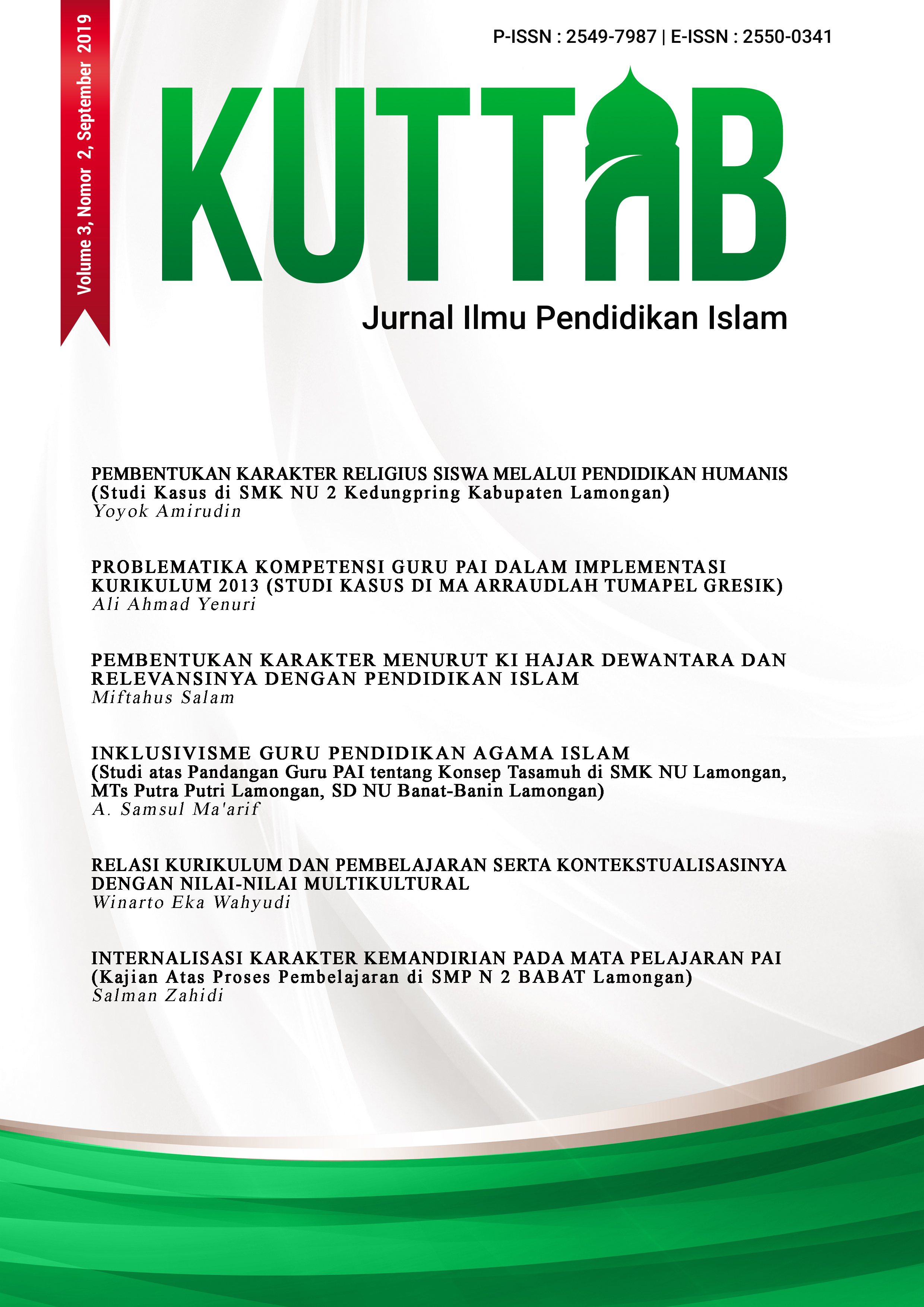INKLUSIVISME GURU PENDIDIKAN AGAMA ISLAM (Studi atas Pandangan Guru PAI tentang Konsep Tasamuh di SMK NU Lamongan, Mts Putra Putri Lamongan, SD NU Banat-Banin Lamongan)
DOI:
https://doi.org/10.30736/ktb.v3i2.265Abstract
Educational institutions in which there is an educational process, have a function not only in the aspect of developing science, but also have a mission to improve the quality of personality through good character. In this position, the teacher has a role in instilling inclusive values (tasamuh) in the learning process that can be applied in everyday life as well as the process in developing the potential of their students. Each educational institution or each teacher will have different tasamuh values in each habituation or teaching. Get used to communicating with others using the language of unity, namely Indonesian, helping each other, not blaming others, especially fellow Muslims, especially other religions, and respecting different principles and respecting others. This study focuses on the views of Islamic Education teachers about the concept of tasamuh and the actualization of the tasamuh attitude of Islamic Education teachers in the learning process at SMK NU Lamongan, MTs Putra Putri Lamongan, SD NU Banat-Banin Lamongan. This study uses a qualitative research method with a phenomenological approach. This study shows that teachers play a role in developing tolerant attitudes to students in the school environment, social groups and even the community, through habituation and learning Islamic Education. The teacher's perspective on inclusive attitudes also plays a role in shaping the personality of students to be more open and respect all differences.Downloads
References
Agil Husin Al-Munawar, Said. “Fikih Hubungan Antar Agama†Jakarta: PT Ciputat Press, 2005.
Aulia, Hilyatul. “Inklusivisme Menurut Masyarakat Muslim dan Kristen Dusun Gendeng Kel. Baciro Kec. Gondokusuman Kota Yogyakarta†Skripsi—Universitas Islam Negeri Sunan Kalijaga Yogyakarta, 2017.
B. Milies, Metther and A. Michael Hubermen. “Qualitative Data Analysis†London: Sage Publication, 1984.
Bukhori, Baidi. Toleransi terhadap Umat Kristiani Ditinjau dari Fundamentalisme Agama dan Kontrol Diri, Semarang: IAIN Walisongo Semarang, 2012.
Falasifah Rizqia, Hasdian. “Hubungan Antara Self Maturity dan Tasamuh pada Mahasiswa Jurusan Tasawuf dan Psikoterapi Angkatan 2012 Fakultas Ushuluddin UIN Walisongo Semarang†Skripsi--Universitas Islam Negeri Walisongo Semarang, 2015.
Kuswarno, Engkus. “Fenomenologi: Metodologi Penelitian Komunikasi†Bandung: Widya Padjajaran, 2009.
Luthfi Zubaidin, Muhammad. “Implementasi At Tasamuh Ahlussunnah Wal Jama’ah Sebagai Nilai Pendidikan Karakter di Madrasah Diniyyah Darul Muttaqin Sukobendu Mantup Lamogan†Skripsi--Universitas Islam Lamongan, 2016.
Nurtaviana Arum, Erinda. “Upaya Guru Pendidikan Agama Islam dalam Menanamkan Nilai-Nilai Tasamuh di SMP Islam Ma’arif 02 Kota Malangâ€,Jurnal Pendidikan Islam, Vol. 4, No. 8 Tahun 2019
Sugiono, “Metode Penelitian Kuantitatif Kualitatif dan R&D†Bandung: Alfabeta, 2011.
Undang-Undang Republik Indonesia Nomor 20 Tahun 2003, Pasal 1, Ayat 1, Tentang Sistem Pendidikan Nasional.















